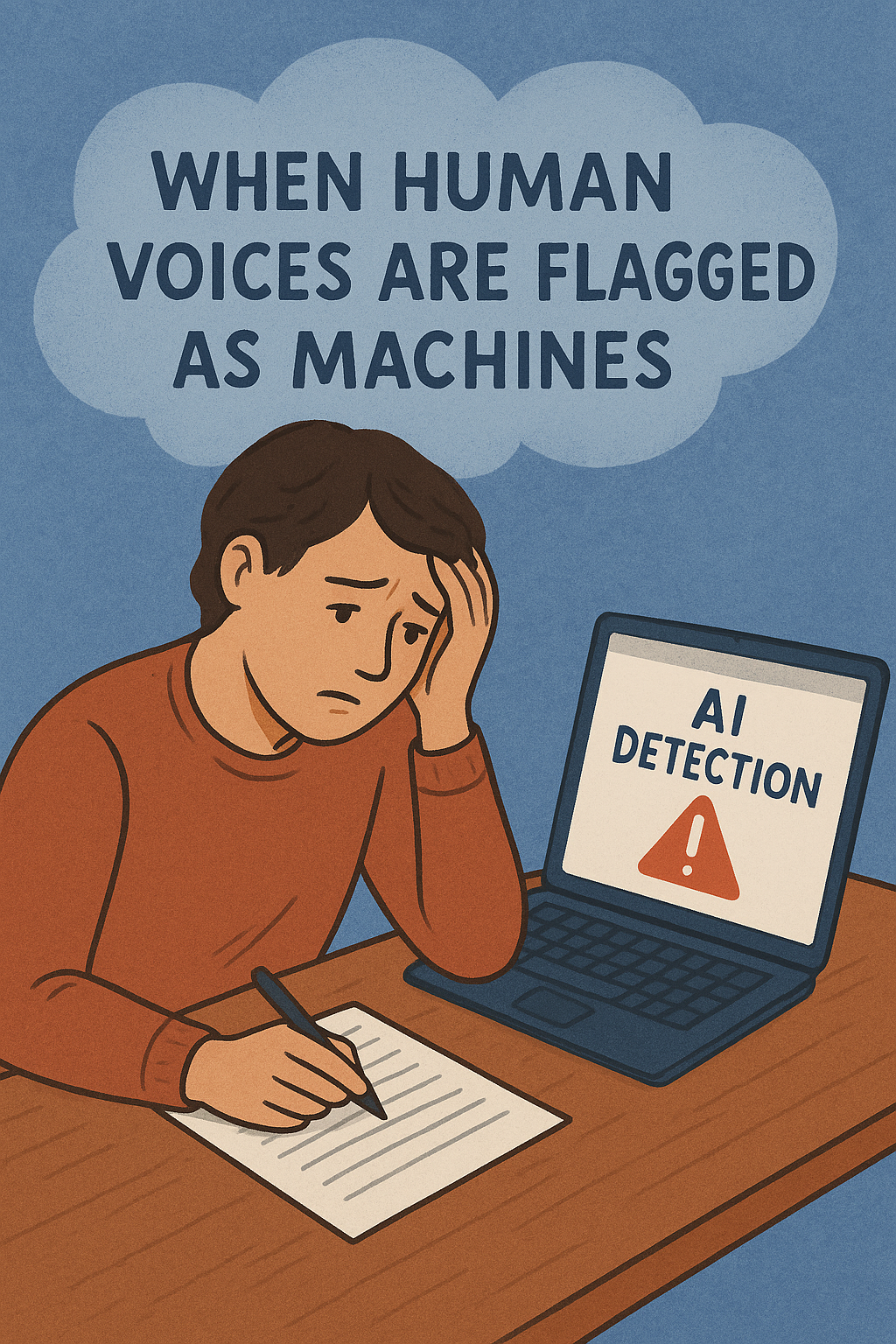
It’s becoming an uncomfortable reality, people who think and write differently are being mistaken for machines. Many neurodivergent writers, including those with ADHD, autism, dyslexia, or other neurological differences, are finding their authentic work flagged as “AI-generated.”
The problem with “AI detection”
AI detectors depend on patterns — on what they think “normal” human writing looks like. They scan for phrasing, structure, repetition, and word predictability. But writing doesn’t fit one mold. Some of us write in long, detailed blocks of reasoning. Some of us repeat for clarity. Some of us are meticulous with language. And some of us just don’t write like everyone else.
When your work gets flagged, it doesn’t just question your writing. It questions your integrity. It says, This can’t be yours. And that can cut deep especially for someone who already works twice as hard to communicate clearly (and still fails).
A personal reflection
I’ve experienced this more than once, and it’s changed the way I write. Professors in college have questioned whether my work was my own, not because it lacked thought or effort, but because it didn’t sound “normal.” I’m now in my fourth degree program, and up until recently, the only things I’d ever been corrected for were minor APA errors and honestly, there are so many of those it’s hard to keep them straight.
Now, I go through everything I write block by block, line by line, trying to predict what a detector might misread. I rewrite sentences that sound too precise or too consistent. I hesitate before turning in assignments. And hitting submit has become something I dread, not because I fear being wrong, but because I fear being labeled a cheater for simply sounding like myself.
The anxiety is real. Every submission feels like rolling dice with my own credibility. I find myself bracing for the email or comment that questions whether I actually wrote my own work when I know every word came from me.
What hurts most is that it’s begun to affect the part of me that used to feel most free my creative writing. For years, writing was how I processed emotion, how I found clarity, how I connected. But lately, I’ve almost stopped. I wrote a song recently, based on a poem I published over a decade ago, and someone accused me of using AI. I could easily prove it was mine, the poem was published to a well known poetry site and is still out there but I shouldn’t have to prove it. That accusation was enough to make me question whether sharing anything creative was even worth it anymore.
Why this matters
Writing isn’t just about structure or grammar it’s about expression. Neurodivergent writing can look different, sound different, and feel different. But different doesn’t mean artificial. It means alive. It means real.
AI detectors don’t understand nuance, and when institutions depend on them to judge honesty, they end up silencing genuine voices. They discourage creativity, vulnerability, and individuality the very things education is supposed to nurture.
Moving forward
I don’t have a perfect answer. I just know that writing shouldn’t feel like something I have to defend. It shouldn’t make my hands shake when I click submit. I’ve spent my life learning, growing, and writing not perfectly, but honestly.
Maybe someday, we’ll stop asking whether something “sounds like AI” and start asking whether it sounds like someone trying to be understood. Because that’s all I’m ever trying to do to be understood.
And if you don’t like what you’re reading, don’t read it — move along. I don’t care.
PS, the featured image is AI-generated. I said I could write, not draw.
Some Studies on this topic:
Brandsen, S., Chandrasekhar, T., Franz, L., Grapel, J., Dawson, G., & Carlson, D. (2024). Prevalence of bias against neurodivergence‐related terms in artificial intelligence language models. Autism Research, 17(2), 234–248. https://doi.org/10.1002/aur.3094Curnow, E., Rutherford, M., Maciver, D., Johnston, L., Prior, S., Boilson, M., Shah, P., Jenkins, N., & Meff, T. (2023). Mental health in autistic adults: A rapid review of prevalence of psychiatric disorders and umbrella review of the effectiveness of interventions within a neurodiversity informed perspective. PLOS ONE, 18(7), e0288275. https://doi.org/10.1371/journal.pone.0288275
Giray, L. (2024). The Problem with False Positives: AI Detection Unfairly Accuses Scholars of AI Plagiarism. The Serials Librarian, 85(5–6), 181–189. https://doi.org/10.1080/0361526X.2024.2433256
Hyatt, J.-P. K., Bienenstock, E. J., Firetto, C. M., Woods, E. R., & Comus, R. C. (2025). Using aggregated AI detector outcomes to eliminate false positives in STEM-student writing. Advances in Physiology Education, 49(2), 486–495. https://doi.org/10.1152/advan.00235.2024
Quigley, E., & Gallagher, T. (2025). Neurodiversity and higher education: Double masking by neurodivergent students. European Journal of Special Needs Education, 1–17. https://doi.org/10.1080/08856257.2025.2511369